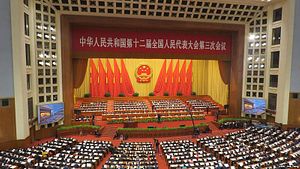On March 15, 2015, the last day of the Third Session of the 12th National People’s Congress (NPC), it was announced that Qiu He, deputy party secretary of Yunnan, was being investigated by the “Organization” (zuzhi) for suspected serious violations of the party discipline and the state law. Three days later, on March 18, it was announced that Qiu He had already been deprived of his leadership posts (lingdao zhiwu).
Undoubtedly, the downfall of Qiu He was swift, literally in minutes if not in seconds. The first announcement appeared on the website of the Central Commission for Discipline Inspection and the Ministry of Supervision at 12:55, 20 minutes after the closing remarks of Premier Li Keqiang at the NPC press conference. But Qiu’s dismissal has raised the issue of NPC deputies’ political immunity.
According to Article 74 of the Constitution of the People’s Republic of China, “No deputy to the National People’s Congress may be arrested or placed on criminal trial without the consent of the Presidium of the current session of the National People’s Congress or, when the National People’s Congress is not in session, without the consent of its Standing Committee.”
Since Qiu He is also a deputy to the 12th NPC, Article 74 applies to his case. Technically, Qiu has not been “arrested.” He is simply being “investigated” for violations of the party discipline and the state law. But under the rule of shuanggui (where the individuals concerned are detained and interrogated during a designated time period at a designated place), he must have lost his freedom: freedom of mobility, freedom of meeting the press, and freedom of publicly defending himself.
Apparently, it was not necessary to get the consent of the Presidium of the Third Session of the 12th NPC because the Session had ended three hours and 13 minutes earlier, at 9:42am on that day. But there was no clear indication that the Standing Committee of the 12th NPC had given its consent. It is difficult to imagine that the NPC Standing Committee had had an emergence meeting within three hours of the closure of the Third Session.
One may argue that Qiu’s constitutional rights as a NPC deputy have not been seriously violated because he is simply being “investigated.” One could also argue that there was no need to get consent from the NPC Standing Committee because he was being investigated by the “Organization.” But at least on the surface, one may have the impression that the Central Commission for Discipline Inspection (CCDI) has violated the Constitution of the PRC.
Nevertheless, no one in China would question the legality of the CCDI and its decisions. After all, the NPC and its Standing Committee are under the leadership of the Chinese Communist Party.
































